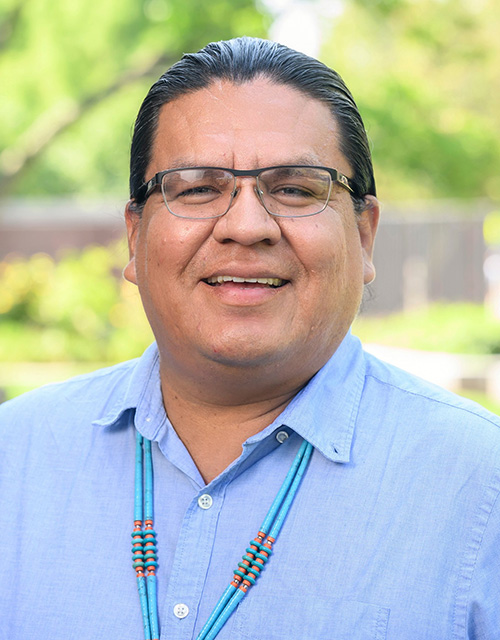
Indigenous Leadership
Navajo Scholar’s Research Aids Educators of Native Students
Oliver Tapaha’s research pushes the boundaries of Indigenous-centered, culturally-responsive education and leadership. Through it, he gives Navajo and other Indigenous peoples a voice and a way to reconnect with their roots.

Oliver Tapaha, an Illinois Distinguished Postdoctoral Scholar in the department of Education Policy, Organization & Leadership is a citizen of the Diné (Navajo) tribe from northeastern Arizona. (“Citizen” means he is more than one-quarter Navajo.)
He came to the University of Illinois Urbana-Champaign in fall 2023 as a DRIVE (Diversity Realized by Visioning Excellence) postdoc scholar. For one of his projects last fall, he wrote a chapter on the history of Navajo education from the Navajo Long Walk in 1868 to 2000 for an edited book. That research led him to an important discovery.
“When I was looking into the history of Navajo education, I learned that Black educators came to the Navajo Nation to teach,” he says. “They were recruited to teach on the Navajo reservation after the 1954 Brown vs. the Board of Education decision.” In that decision, the U.S. Supreme Court ruled that laws establishing racial segregation in public schools were unconstitutional.
“It’s an important work because it’s really unknown,” he says. “It will be new information for everybody. This year marks the seventieth anniversary of Brown vs. the Board of Education, so it’s a timely piece of history that nobody knows about. It’s important to unwrap it and share it with the public.”
Tapaha’s heritage and culture are of great importance to him. His maternal clan is Naakai Diné’e (the Mexican People Clan) and his paternal clan is Hónágháahnii (The- One-Who-Walks-Around Clan). His family bond, including both sets of grandparents, is extremely strong. He grew up speaking the Diné language and hearing the stories of his elders, of the ancient ways of life. His parents taught him to never forget his roots and encouraged him to get a good education so that he could walk in two worlds at once.
“We need more Indigenous scholars,” Tapaha says. “Navajo education and Indigenous education are under-researched. And the people who do the research are outsiders who come in and get their information and then write about it.”
Instead, Tapaha says, what’s needed is scholars who come from Indigenous communities and who go back to their own communities to shed light on what’s taking place in the schools and how to address education issues.
“I want to help people to rethink and recenter their work on how to embrace what Indigenous education and teaching and learning and leadership is and looks like. That’s what drives my work.”
I want students to understand who they are, where they come from, and how they can contribute back to their community based on the knowledge that they’re gaining in the education system. And the knowledge they’re gaining from the environment and the community, because those are equally important.” —Oliver Tapaha
